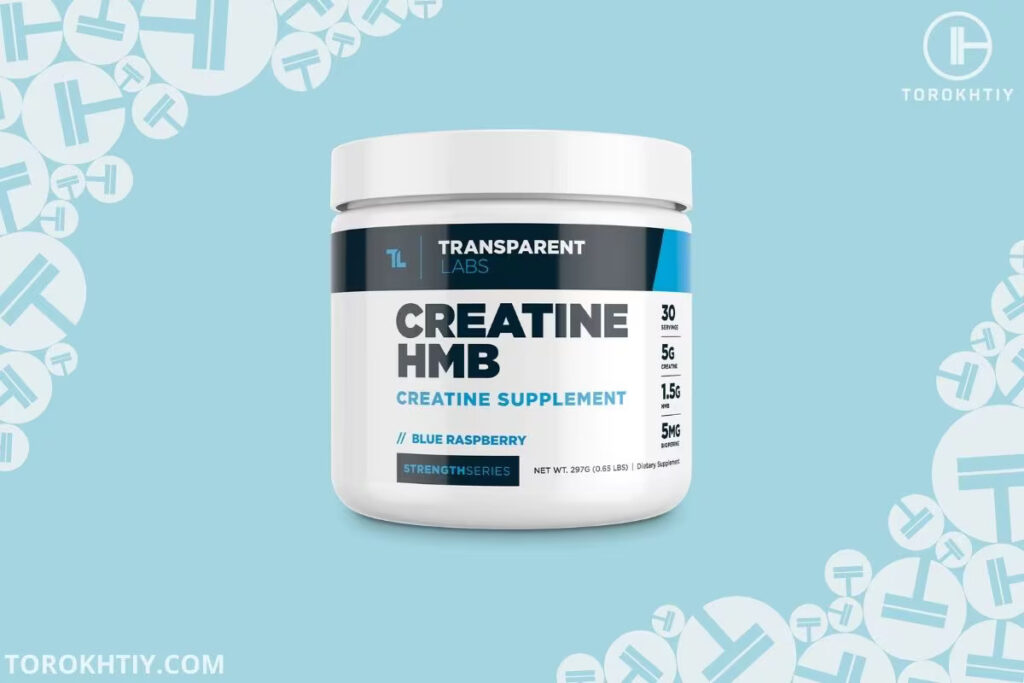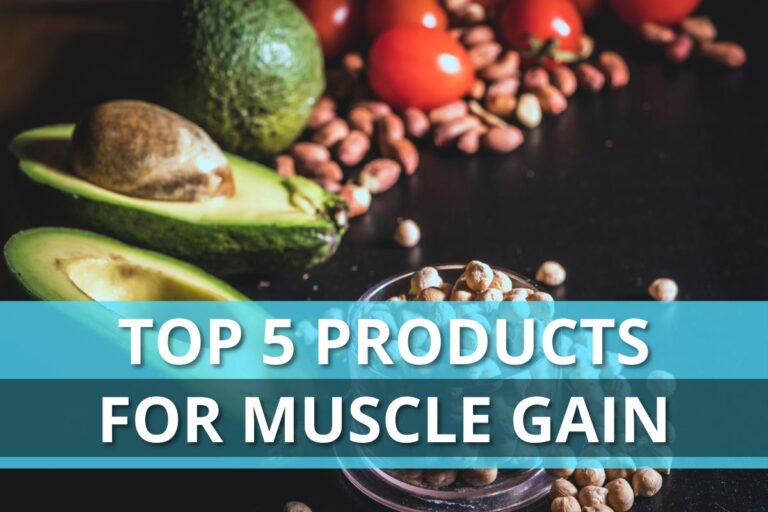How Much Creatine Should I Take? Creatine Dosage Explained
With proper supplementation of creatine, the muscle cells of the body are likely to become saturated, which can then maximize the capacity for energy (ATP) through the creatine phosphate system.
In other words, creatine supplements can be effective for short bouts of power based movements like sprinting or powerlifting.
At this point, you may be thinking something along the lines of “How much creatine should I take?” or “how much creatine per day to build muscle?”
To answer these questions, we have covered the recommended creatine dose either through the “loading” or “without loading” protocols.
Secondly, we have put forward our take on the best way to ingest creatine, covering how it should be distributed throughout the day, and if it is advantageous to take with a specific food/beverage.
How much creatine should I take? You would employ an initial loading phase of ~20-25g of creatine per day for around 5-7 days, which would then be followed by a maintenance dose of 3-5g. The other option is to take a regular dose of 3-5g per day.

How Much Creatine Should I Take?
Throughout this article, we will be referring to creatine monohydrate dosage. The reason for why we recommend creatine monohydrate is due to it being the most researched and possibly the most effective form of creatine.
To our knowledge, there are over thousands of peer reviewed research papers that have evaluated the effects of creatine monohydrate on muscle physiology and sport/exercise performance.
Most of which have shown promising results with similar creatine dosage per day to what we have highlighted throughout this article.
So now the question becomes, “how much creatine monohydrate should I take?” The amount of creatine you take entirely depends on you as the individual.
Generally, the recommended dose of creatine monohydrate stands at 3-5g per day, as this has shown to be effective in boosting performance after a short period of time. Those with more muscle mass may need even higher amounts of creatine for maximum effect.
Then again, we must take into account the optional “loading phase” of ~20-25g of creatine per day, followed by a maintenance dose of 3-5g per day.
In terms of muscle size, creatine itself may increase intracellular fluid. This fluid can make the muscles appear larger and more impressive. However, this does not directly have an effect on muscle hypertrophy.
Creatine should increase the size of the muscle cells in the long term by making you workout with more intensity, thus creating overload.
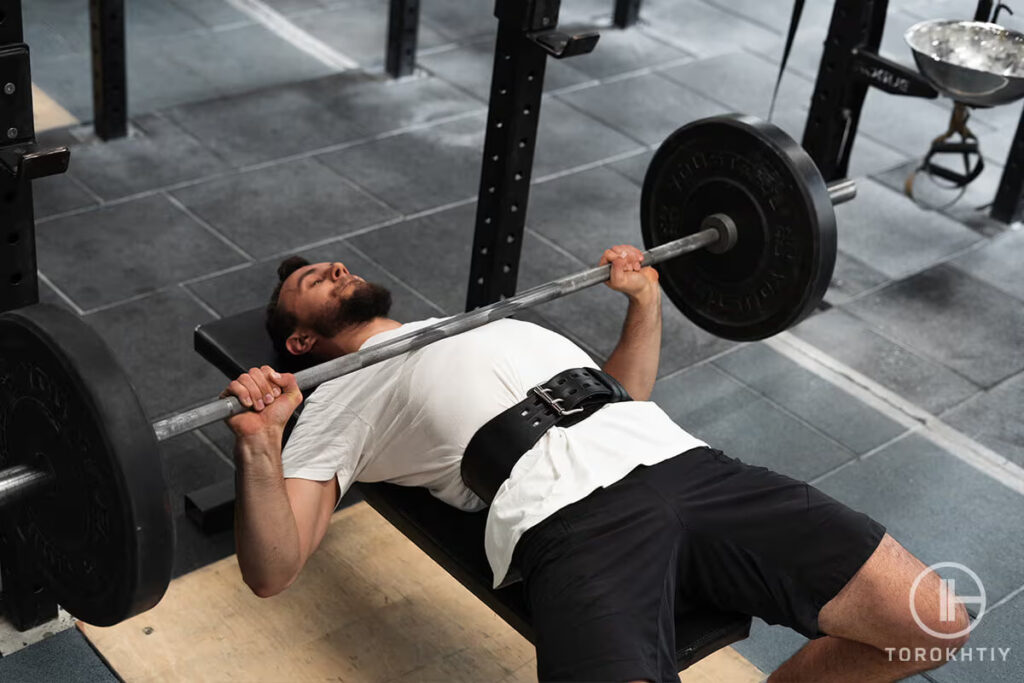
What Are The 2 Protocols For Taking Creatine?
There are two protocols when it comes to taking creatine, you could either “load” creatine for a short period of time, which allows for rapid muscle saturation. Loading is followed by taking a smaller and regular maintenance dose of creatine.
On the other hand, you could take a smaller and regular “non loading” creatine dosage per day, which takes considerably longer to take effect.
From an expert’s perspective, consuming a regular 3-5g of creatine is enough. However, you can make your own decision based on the more details on these protocols that we have covered below.
1. With Loading Phase
If you have decided to go the route of “loading”, essentially a daily creatine dose of ~20-25g would be consumed.
This may seem like an exaggerated amount of creatine, but it can simply be split into 4-5x5g doses, taken throughout the day with a beverage of your choice. This is equivalent to five teaspoons.
The duration of loading would be around one week, which has shown to saturate the muscle cells with creatine and begin to show a modified performance.
Thereafter, to maintain optimum creatine saturation and performance, one should transition into a 3-5g dose for as long as you are exercising.

Contrary to common belief, cycling off creatine is not needed as there is no evidence of continual use being detrimental towards health.
Although it is not always necessary, for a more calculated creatine dosage by weight you could use the following equation 0.3 x each kilogram of body weight and then divide which can then be split into five daily servings. For example, 0.3 x 80kg = 24g.
In sum, loading allows you to saturate your muscles with creatine faster, usually a week is enough to reach maximum saturation. The downside is the increased risk of stomach discomfort when taking high doses of creatine. Dividing into smaller portions throughout the day reduces this risk.
2. Without Loading Phase
The “without loading” phase is the simpler and more cost efficient protocol in our opinion. The reason for this is that you would take a smaller and regular creatine dose of 3-5g per day.
The only disadvantage of implementing the “none loading” phase is that it takes up to 21 days longer (~28 days). Similar to the “with loading” phase, there is no need to cycle off creatine.

How to Take Creatine for Best Results?
We have explored the “best” way to take creatine based on our opinion below.
Is It Better To Use A Loading Phase Or The Regular Protocol?
For those of you who want to see the effects of creatine ASAP, then the loading protocol is the better option. Loading would likely saturate the muscle cells within a week.
On the opposite side of the spectrum, if you have a bit more patients, the regular protocol would take just under a month and would be slightly more conservative on creatine.
Can I Take 20G Of Creatine At Once?
From a practical standpoint, taking a 20g creatine serving is not optimal, but can be taken during a loading phase.
In some cases, consuming creatine in this manner may cause gut issues, like diarrhea, nausea and cramping.
As we have established, the better option would be to split total creatine into a few servings per day.
Based on anecdotes, many lifters take 5g of creatine with each meal and snack, mixed with a beverage of their choice, like protein shakes, juices, and water.
Can I Take Creatine With Carbs Or Carbs + Protein?
Many believe that when creatine can be combined with carbs or carbs + protein it can increase creatine uptake, but the research is too scarce to push this idea into practice.
In fact, a study in the journal Biology of Sport by Theodorou and colleagues, looked at the effects of combining creatine monohydrate supplementation with a carbohydrate source vs. creatine alone after exercise, over a period of four days.
All of the participants performed 30s wingate testing, which is basically high intensity interval cycling. All groups experienced a modification in peak power, but was NOT significantly different, thus supporting the idea that combining carbohydrates will not give any advantage.
Nevertheless, you can take creatine with the food/beverage of your choice if it makes it easier to swallow.
As a general recommendation, you could mix creatine with a whey protein shake after your workout. This is not with the expectation of any advantage in performance, but just to get into the habit of taking these supplements. However, you can also use any beverage you like.
The Creatine Supplement That We Recommend – Transparent Labs Creatine HMB
Transparent labs thrive off transparency, thereby being one of the most diverse supplement brands on the market. All products sold by transparent labs are third-party tested to ensure that the ingredients are authentic and safe for human consumption. Furthermore, every single one of their products are free from artificial food additives, colors, or preservatives.
At this moment of time, transparent labs has a very diverse product line, but we are going to be covering their Creatine HMB.
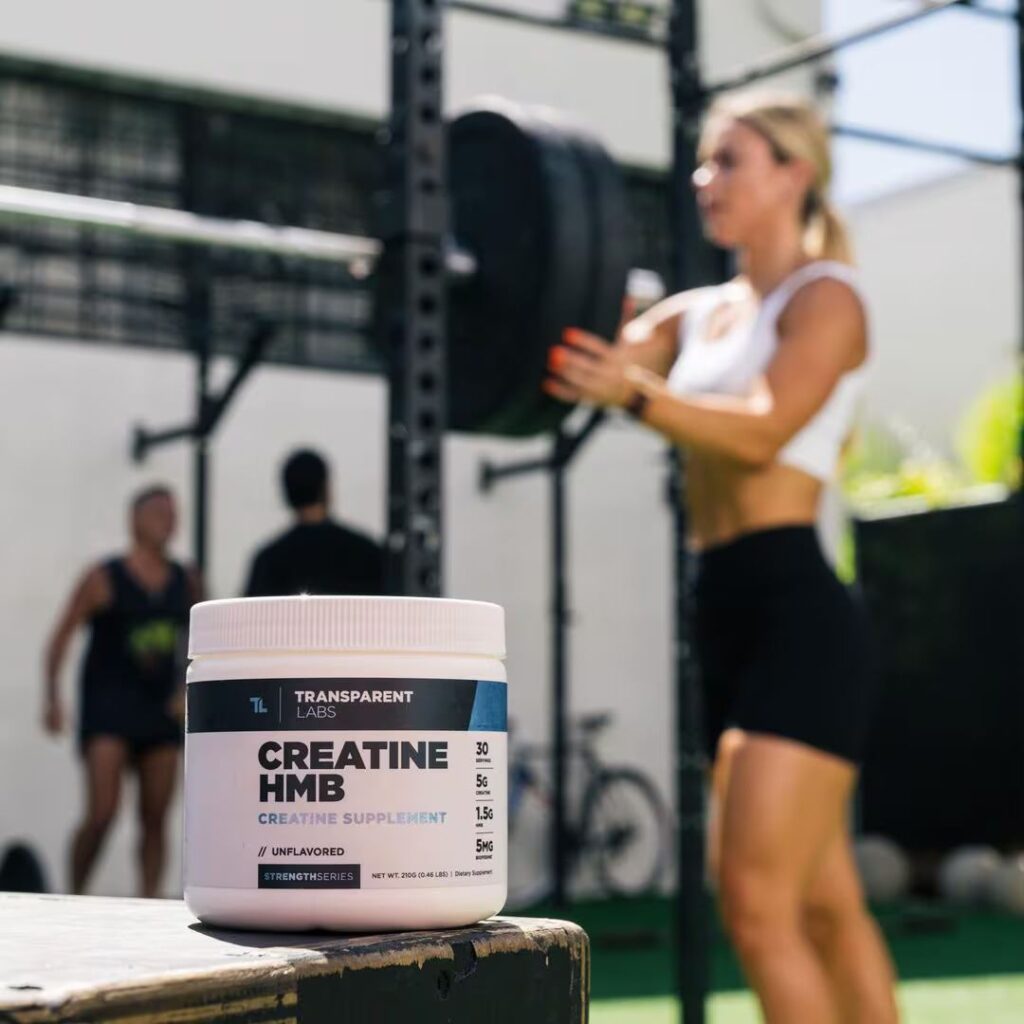
- Item form: Powder mix
- Best for: Power output, muscle/strength gains, recovery, nutrient absorption, contribute to bone health
- Type: Creatine monohydrate
- Servings per container: 30
- Suitable for vegans: Yes
- Other ingredients: HMB, Vitamin D, Bioperine, Tartaric acid, Malic acid, Natural flavors, Stevia extract, grapefruit powder
- Price per serving (9.9g): ~$1.6
- Company founded: 2015
- Recommended by athletes: Hafthor Jullius Bjornss, Kelsey Henson, Paul Sclar
1. Supplement Facts
Creatine HMB is not just a simple creatine product, it is a blend of different performance boosting ingredients including creatine monohydrate, vitamin D, HMB, and bioperine.
2. Nutrition Label Transparency
Just like any other product sold by transparent labs, the creatine HMB is clinically dosed and 3rd party tested to ensure safety and authenticity. Secondly, creatine HMB is free from any artificial sweeteners or colors, which makes it a “healthy” option.
Transparent labs have shown Creatine+ HMB (beta-hydroxy-beta- methylbutyrate) to be superior for lean muscle gains compared to creatine and HMB taken on its own, highlighting why the nutrition label of their product is so transparent.
What really increases the transparency of creatine HMB is the fact that it is batch tested by “informed choice”, which ensures that the product is less likely not cross contaminated with any prohibited ingredients in elite sports. To go the extra mile in transparency, creatine HMB is suitable for vegans.
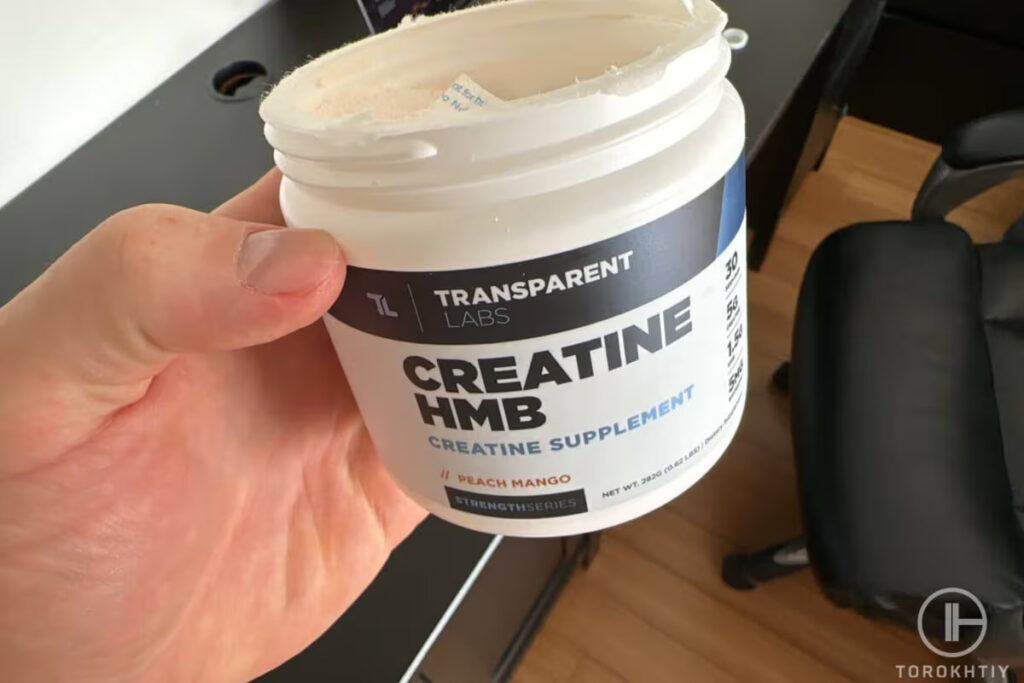
3. Solubility
How many scoops of creatine should you take? Just the one for Creatine HMB. Transparent labs use a pure creatine monohydrate so it mixes well with water or a light beverage. However, some of the other ingredients like HMB, vitamin D, and bioperine may affect its solubility to some degree.
4. Value For Money
Considering the overall quality of the product and the inclusion of so many performance boosting ingredients, Creatine HMB is great value for money at ~$1.6 per serving.
FAQ
Can You Take 10G of Creatine a Day?
10g per day may be required to saturate the muscle cells of those who possess a lot of muscle mass. You can also use this dose during the first few weeks of creatine use to speed up muscle saturation even if you don’t have a huge muscle mass. After that it is necessary to move to a maintenance dose of 3-5 g per day.
How Much Creatine Should I Take for Best Results?
Most people can see the best results with 3-5g of creatine per day, which would be taken every day for about a month to saturate the muscles.The maintenance dose is also 3-5 g per day and can be taken for many months or even years.
Is 20G of Creatine a Day Good?
It most certainly is good for those who are going through a loading phase of creatine which usually lasts one week.
How Much Creatine Is Too Much?
Taking more than 0.3g/kg of creatine per day would be considered as creatine overloading and would likely not provide any advantage in terms of muscle saturation or exercise performance.
How Many MG of Creatine Should You Take a Day?
Doing the conversion from grams, you may need at least 5000 mg of creatine per day.
How Many Creatine Pills Should I Take a Day?
It depends on the creatine dose of each pill! for example if each pill contains 1000 mg of creatine, you may need 5 pills per day to hit 5000 mg (5g).
Conclusion
We have learnt that creatine supplements can help improve strength and power for exercise performance.
Before you begin to reap the rewards of creatine, you must maximize muscle creatine stores by going through a loading phase of 20-25g of creatine per day for 5-7 days. Creatine loading is followed by a maintenance dose of 3-5g of creatine per day.
While loading, you could take a bolus of creatine, for example 20g. Optimally, total daily creatine should be split into 4-5 doses as this is more practical and reduces the risk of digestive issues.
The other option is to ingest a regular 3-5g dose of creatine per day, which would take just under a month to take effect.
Combining creatine to a specific food or beverage (i.e, protein or carbs), will not make a difference in terms of muscle absorption or exercise performance, therefore is only optional.
Thank you for reading, please feel free to leave a comment, question, or query and we will get back to you as soon as possible, if required.
Also read:
- Does Creatine Make You Gain Weight
- Creatine Hcl vs Monohydrate
- Micronized Creatine vs Monohydrate
- Best Creatine at Gnc
- Does Creatine Help You Lose Weight
- Is Creatine Safe for Teens
- Should You Take Creatine Before or After a Workout
- How Long Does Creatine Take To Work
- Best Creatine Supplement for Women
References:
- Wax, B., Kerksick, C.M., Jagim, A.R., et al. Creatine for Exercise and Sports Performance, with Recovery Considerations for Healthy Populations Nutrients, 13(6): 1915, 2021
- Powers, M.E., Arnold, B.L., Weltman, A.L., et al., Creatine Supplementation Increases Total Body Water Without Altering Fluid Distribution Journal Of Athletic Training, 38 (1): 44-50
- Jurado-Castro, M.J., Navverrete-perez, A., Rancel-Sanches, A., et al. Optimum timing in creatine supplementation for improved sporting performance Arch med deporte 38(1): 48–53, 2021
- Theodorou, A.S., Paradisis, G., Smpokos., et al., The effect of combined supplementation of carbohydrates and creatine on anaerobic performance Journal Biology Of Sport 34 (2): 169-175, 2017
- Hultman, E., Soderlund, K., Cederblad, G., et al. Muscle Creatine Loading In Men Journal Of Applied Physiology 81(2): 232–237
Why Trust Us?
With over 20 years in Olympic Weightlifting, our team does its best to provide the audience with ultimate support and meet the needs and requirements of advanced athletes and professional lifters, as well as people who strive to open new opportunities and develop their physical capabilities with us.
By trusting the recommendations of our certified experts in coaching, nutrition, dietology, and sports training programming, as well as scientific consultants, and physiotherapists, we provide you with thorough, well-considered, and scientifically proven content. All the information given in the articles concerning workout programming, separate exercises, and athletic performance, in general, is based on verified data. We ensure that you can rely on our professionals’ pieces of advice and recommendations that can be treated as personalized ones which will benefit you and fully meet your needs.
The product testing process is described in more detail here
Author: Oleksandr Maksymenko
Certified Sports Nutritionist,
MSc Sports Dietetics
Specializing in: Weight management, Fitness / Sports nutrition
Oleksandr is a professional fitness nutritionist certified by the Fitness Professional Association (FPA). He follows the principles of evidence-based dietetics and fosters a healthy relationship with food in his clients, ensuring there are no strict prohibitions on their favorite foods or frequent lapses. His primary goal is not only to achieve results for you but also to sustain them over the long term, all while enjoying tasty and delicious food.

